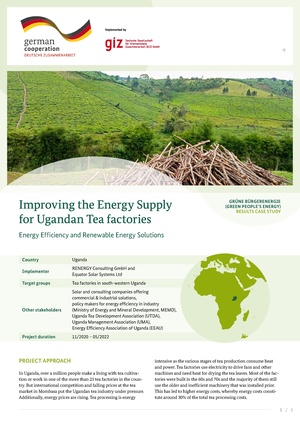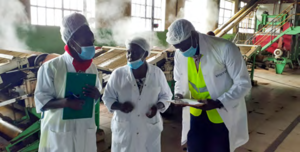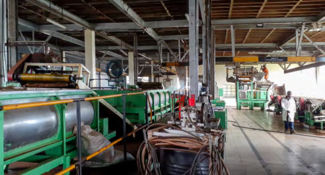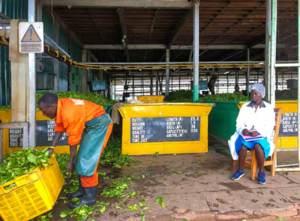Improving the Energy Supply for Ugandan Tea factories
Improving the Energy Supply for Ugandan Tea factories
Project Approach
In Uganda, over a million people make a living with tea cultivation or work in one of the more than 25 tea factories in the country. But international competition and falling prices at the tea market in Mombasa put the Ugandan tea industry under pressure. Additionally, energy prices are rising. Tea processing is energy intensive as the various stages of tea production consume heat and power. Tea factories use electricity to drive fans and other machines and need heat for drying the tea leaves. Most of the factories were built in the 60s and 70s and the majority of them still use the older and inefficient machinery that was installed prior. This has led to higher energy costs, whereby energy costs constitute around 30% of the total tea processing costs.Tea factories rely on fuel wood to generate steam and heat for the drying process. Their demand for wood fuel is largely satisfied from eucalyptus plantations which provide a source of income for local farmers. Additionally, tea factories have high costs for electricity and diesel. In this context, the Green People’s Energy programme (Grüne Bürgerenergie, GBE) formed an integrated development partnership (iDPP) with Equator Solar Systems Ltd, a German-Ugandan company and Renergy Consulting, a German company, to identify ways to reduce energy costs of tea factories and make them greener. The iDPP is financed by equal contributions from GBE Uganda and the private sector partners (Renergy Consulting and Equator Solar Systems Ltd). Drawing on their speciality in sustainable energy solutions and advisory services, the two firms proposed to conduct site-specific energy audits for selected tea factories, accompanied by a number of outreach events, including webinars on energy management system as well as sustainable energy options which promote the solutions to the business community and policy makers nationwide.
While the project was scheduled to work closely with five tea factories, ultimately seven signed up for the advisory services. These included a visit to the factory by the experts of the partner firms, an energy audit and on-site discussions. Each factory was provided with a detailed assessment sheet and tailored sustainable energy options proposed to the factory manager, including options like:
- A fuel wood drying routine
- Upgrades of boilers and electric motors
- Insulation for steam distributions pipes
- Solar photovoltaics to replace grid energy
- Reconfigurations of electrical equipment (capacitor banks) to compensate for fluctuations in power quality
- Uptake of full energy management systems in compliance with ISO50001.
The results of the energy audits are disseminated at the outreach events, including a final conference and networking activities. In this component the project reaches out specifically to financiers and started matchmaking between the tea factories and banks, as the solar systems in particular requires significant financial investments. The overall objective of this project is to develop the market for holistic decentralized renewable energy and energy efficiency solutions and showcase specific examples.
Methodology of Data Collection
The data for this case study report was collected through a project document review and three qualitative interviews. Of these, one included two representatives of GIZ/GBE, the second, two representatives of a solar supplier company. The third interview partner was a representative of the counterpart of the project, the Ugandan Ministry of Energy and Mineral Development (MEMD). The case study was conducted between April and May 2023.
Key Findings
Project Achievements
The project demonstrates that energy savings and substitution of fossil energy at tea factories are possible and cost effective. During project implementation, the tea factories implemented the recommendations from the consultants of Renergy, Equator Solar and the GBE project team, leading to immediate energy savings. Drying the fuelwood before burning can save up to 30% in fuelwood use within the factories, as use of dry fuelwood makes the burning process more efficient. Additional fuelwood savings can be achieved through pre-heating the boilers as well as insulating the pipes to reduce energy losses and increase energy efficiency. This was already implemented or recommended by the project in all seven participating tea factories. The savings in fuel-wood reduce the costs of the drying process and thus contribute to improving the economic efficiency of the tea factory. Furthermore, an indirect contribution is made to reducing deforestation of the local forests. In addition, by the end of the project, four of the seven tea factories had committed to installing solar photovoltaics, another three were considering it. One of the recommendations from the project to the factories is the use of bank capacitors. These components moderate the quality of the electricity and increase the efficiency of the use of energy. Power quality is often a challenge in rural grids in developing countries and this solution is often overlooked. It is particularly beneficial if the factory consumes its own solar energy. It will lead to a better utilization of the solar energy and fewer outages. With it, the tea factories can cover an even higher proportion of their electricity needs through self-generated solar power. Triggered by the energy audits, five of the factories are looking into the issue or had already adjusted the functionality by the end of the project.Beyond the immediate savings, the tea factories gained insights on the process and benefits of ISO 50001 certification. Four of them were already equipped with some kind of energy management or plan to implement it now. The very effective outreach strategy of the project led to an involvement of important stakeholders that served to disseminate the results. Beyond the MEMD, these include associations from the industrial and rural sectors of Uganda, the Ministry of Agriculture, the National Forest Authority, and various interested media parties. This forms a good basis for a larger scale replication.
Intermediate Impact
The project is contributing to a larger market for energy audits in Uganda. Already during project implementation, two factories who wanted to join the project, paid for the energy assessments themselves. Other tea factories are preparing for energy audits. Tea factories that have been audited are now using the customized recommendations to source suitable products and services - the markets for updated boilers and drives as well as solar power equipment are growing. The project as well as the energy audits had also included financial assessments and cost-benefit analyses of these components in the energy audits, but many tea factories had challenges affording initial investment costs. Negotiations with banks were indirectly facilitated through the project by building on the added credibility provided by the third-party energy assessments.
A notable success beyond the immediate impact was that the project helped spark the interest of the political partner (MEMD) in renewable energy and energy efficiency for commercial and industrial energy consumers in Uganda. Ministry officials participated not only in outreach events but also in field visits to some of the tea factories. These political partners can now use their first-hand insights in their policy making, i.e. to make amendments to relevant policies such as the net-metering bill which is currently under revision. The MEMD is also actively integrating the new approaches and incentives into other Ugandan energy policy and the discourse on enabling environments. For instance, MEMD has organised a small exhibition with a renewable energy conference and a power forum for businesses in the energy sector.
Challenges in Project Implementation
According to the GBE team, the implementation of this partnership project was straightforward, without any major incidents. A significant challenge, though, at least for one of the implementing partners, was the sheer geographic distance that they had to cover between the tea factories. The solar and advisory firms are typically located in urban areas, but tea is grown in remote rural locations, which implies long travel times for field visits, technical installations and maintenance. In addition, some are suffering from weak cell phone coverage, and the firms’ teams were unable to communicate in the local dialect in at least one factory. Luckily, factory managers typically had higher education degrees and spoke English so that technical conversations were possible. During the energy assessment, it was challenging to gather technical data about factory machinery and its performance. This was because most of the machines are old and documentation on technical details such as the date of purchase, maintenance carried out and repairs was not always available, not to mention energy consumption data. Thus, the energy audits only relied on partner firms‘ measurement instruments. This means that factory staff would not be able to understand the energy consumption and identify energy efficiency opportunities, without additional support. For further data-based energy efficiency improvements, as envisioned through the ISO 50001 cycle, better access to information is necessary. While renewable energy solutions are excellent for energy security and managing financial costs of energy, they also have some disadvantages. For example, not all tea factories could provide sufficient space for them.
Lessons Learned
The project demonstrated the importance of approaching rural enterprises in Africa on-site and supporting them directly. Practical, hands-on approaches and deep analysis of specific situations were found to be beneficial. The tea factories commented that they saw the partnerships with technical experts and the access to expertise from Germany as valuable. Strong implementing partners with professional staff were also ultimately responsible for the impressive success and progress reached. The challenge of financing could be mitigated by the project through putting factories in touch with financiers. This is a persistent lesson of renewable energy projects and should be integrated in all comparable projects, also for commerce and industry, as it was done here.The project required a significant amount of communication and data sharing, between the factories and the consulting firms, but also with GIZ and the broader audience. The lesson is that energy efficiency is not only a technical challenge but can only be achieved through constant information exchange. It was clear that the policy framework needed improvement. In taking the policy makers to the field, they could gain a new perspective in the direct dialogue with the factory and the consultant. This helped inform policy makers and potentially has shaped the government’s support for further market development.The timing of the project was good. Interest in the project spiked because of a difficult situation of the tea factories: High energy prices coincided with low margins in the tea sector. This created a high demand for energy audits, and made energy efficiency measures and solar energy financially very attractive. Another lesson learned is that regular training of the management staff is considered useful to continue the implementation of some measures. This is particularly true for measures that have a large behavioural (rather than technical or investment) angle.
Sustainability of the Intervention
The excellent communication strategy applied among project partners as well as with the political partners clearly contributed to the success, as the interviewees unanimously stated. But it also leads to the sustainability of the endeavour and continued market development. For instance, relevant national-level associations were present at the webinars. They will serve as multipliers and include the benefits of energy audits and sustainable energy investments into their messaging from now on, to foster continuity. Specifically, the Uganda Manufacturing Association (UMA), is committed to knowledge transfer. They are organizing webinars to inform larger audiences on energy audits and their potential for improved energy management and cost savings. The MEMD for its part, is working towards integrating energy efficiency through energy audits into its policy making. They are exploring appropriate policies and the necessary knowledge exchange between the economic actors involved. The project results contributed positively to the design of the new MEMD policy and accordingly to the sustainable use of the showcase results, as highlighted by several interviewees.Sustainability is also aided by the fact that several challenges are going to get less prominent with the increased introduction of energy management systems. For example, while the initial energy audits suffered from a lack of data on the energy performance of the equipment, this will be mitigated in the coming years, as the machinery is updated. Specifically, through energy monitoring in the context of the ISO 50001 certification, new opportunities for energy savings will be continuously brought to the attention of factory managers..
Conclusion and Outlook
The energy-intensive tea production in Uganda, with often out-dated machinery and in remote locations with weak power grids, can be significantly improved through sustainable energy appli- cations and systematic energy management. The approach used in this project - on-site energy audits and financial match-making - can be widely adopted in the Ugandan tea industry if industry stakeholders and policy makers “tell the story”.
The scalability of the project approach is rated as very high by the interview partners. In addition to the tea industry, other agriprocessing sectors such as the dairy sector and the food industry in Uganda offer opportunities for energy savings through energy management systems and sustainable energy solutions. The political partners of the MEMD have already taken up the suggestions for further development of their energy policy approaches. A cooperation between the private and public sector may have the potential to strengthen the successful approach of energy audits and facilitate its provision to other energy-intensive sectors. This could stimulate demand for energy efficiency assessments and lead to improvements, which in turn will contribute not only to greenhouse gas emission reductions but also to more energy security and lower energy costs for the Ugandan agribusinesses.
The potential impact of the project approach is very high, due to the demand from the tea sector as well as other energy-intensive industries in Uganda. However, the implementation will need to take place on-site, in the remote commercial and industrial facili- ties. This project set a standard for how to reach them and how to lead them to implementation success.























